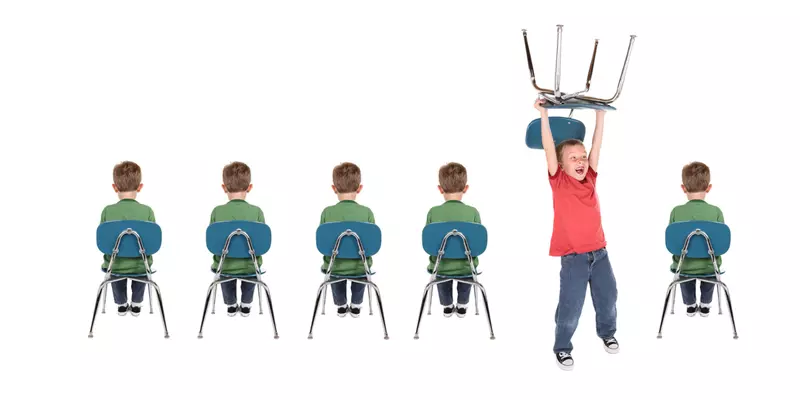
Content updated from previous publish date.
“I’m so ADD.”
“I’m having an ADD moment.”
“Everyone has a little ADD.”
People often use these common phrases whenever they get distracted, fail to follow through on something, or show up late. But these off-handed comments don’t reflect the reality of having attention deficit disorder (ADD), more commonly called attention deficit hyperactivity disorder (ADHD). In fact, they perpetuate several ADD/ADHD myths that are harmful to the millions of Americans who have this condition.
Research shows that ADHD is, in fact, underdiagnosed. Less than half of all children with ADHD are being treated and fewer than 20% of adults with the condition are currently diagnosed or receiving treatment. Click To Tweet9 HARMFUL ADD/ADHD MYTHS
Myth #1. ADD/ADHD is not a real diagnosis. It’s a flavor-of-the-month illness, a fad diagnosis. It’s just an excuse for bad behavior.
Fact: ADD/ADHD is real, and it devastates many people’s lives. ADD/ADHD has been described in medical literature for over 100 years. A search for “ADHD” on PubMed, an online hub for scientific research, pulls up more than 45,000 results.
Among them are hundreds of brain-imaging studies showing differences in the brains of people with ADD/ADHD compared to those who don’t have the condition. According to the CDC, 9.4% of children ages 2-17 have at one time been diagnosed with ADD/ADHD. It is the most common learning and behavior problem in children, but the issue doesn’t end there. It also affects 4.4% of adults.
Myth #2. ADD/ADHD is overdiagnosed. Every child who acts up a bit, or adult who seems lazy, gets diagnosed with it.
Fact: Research shows that ADD/ADHD is, in fact, underdiagnosed. Less than half of all children with ADD/ADHD are being treated, according to statistics. And fewer than 20% of adults with ADD/ADHD are currently diagnosed or receiving treatment.
Myth #3. ADD/ADHD is only a disorder in hyperactive boys.
Fact: Compared to girls, boys are more than twice as likely to be diagnosed with ADD/ADHD. According to the CDC, 11.7% of boys and 5.7% of girls have been diagnosed with the condition. However, girls are more likely to go undiagnosed because they tend to have the inattentive type of ADD/ADHD.
Females may not be hyperactive or disruptive, so the condition goes unnoticed. These individuals are frequently daydreaming, have trouble with motivation, and may appear “spacey” or preoccupied. They are often ignored because they do not bring enough negative attention to themselves. Many of these children, teenagers, and adults earn the unjust labels “willful”, “lazy”, “unmotivated”, or “not that smart”.
Myth #4. ADD/ADHD is only a minor problem. People make too much of a fuss over it.
Fact: Left untreated or ineffectively treated, ADD/ADHD is a very serious problem. Not only does it have a significantly negative impact on the individual with the condition, but it is also detrimental to the people in their lives and to society at large. For example, findings in the Journal of Psychiatric Research show that an alarming 33% of those with untreated ADD/ADHD never finish high school, compared to the national dropout average of 15%. Untreated ADD/ADHD has also been associated with increased risk of:
- Depression and anxiety
- Decreased academic performance
- Job failures
- Relationship breakups
- Traffic accidents
- Financial problems
- Substance abuse
- Obesity
- A sense of failure
Myth #5. ADD/ADHD is an American invention, made up by a society seeking simple solutions to complex social problems.
Fact: ADD/ADHD is found in every country where it has been studied. A review of 175 studies on the prevalence of ADD/ADHD worldwide in children 18 years of age or younger estimates that 7.2% of kids have the condition. A 2021 study in the Journal of Global Health found that 6.76% of adults around the world have symptomatic ADD/ADHD, which translates to over 366 million adults worldwide. The prevalence of persistent ADD/ADHD in adults around the globe is 2.58%, representing nearly 140 million individuals.
Myth #6. Bad parents or bad teachers cause ADD/ADHD. If only our society had old-fashioned values, there wouldn’t be these problems.
Fact: Ineffective parents or teachers can certainly make ADD/ADHD symptoms worse, but they are generally not the sole cause. ADD/ADHD behaviors often make even the most skilled parents and teachers feel stressed and inept.
Myth #7. People with ADD/ADHD should just try harder. Everybody gives them excuses and coddles them.
Fact: The truth is, for people with ADD/ADHD, the harder they try the worse things get. The brain SPECT imaging work at Amen Clinics shows that in people who don’t have the condition, concentration is associated with increased activity in the prefrontal cortex, an area of the brain involved with concentration, focus, and follow-through. However, when people with ADD/ADHD try to concentrate, there’s a decrease in activity in this part of the brain.
Myth #8. Everyone outgrows ADD/ADHD.
Fact: Many people never outgrow ADD/ADHD and have symptoms that interfere with daily living throughout their lives. Research published in the American Journal of Psychiatry in 2021 shows that approximately 50% of childhood ADD/ADHD remain in adulthood.
Myth #9. Medication alone is the best treatment for ADD/ADHD and has few side effects for most people.
Fact: Stimulant medication is often the first-line treatment for ADD/ADHD. Although it can be effective for some children and adults with ADD/ADHD, it is not helpful for everyone. In fact, stimulants exacerbate symptoms in some people. The brain-imaging work at Amen Clinics shows that there are 7 types of ADD/ADHD, and each type requires its own treatment plan. For example, people who have an ADD/ADHD type called “Ring of Fire,” in which the brain is overactive, do worse on stimulant medication.
In general, medication should never be the first and only thing you try for ADD/ADHD. Treatment must be properly targeted to an individual’s ADD/ADHD type and needs to involve a comprehensive approach that includes beneficial forms of therapy, neurofeedback, lifestyle strategies, parenting skills, nutrition recommendations, and personalized supplements or medications (when necessary).
ADD/ADHD and other mental health issues can’t wait. At Amen Clinics, we’re here for you. We offer in-clinic brain scanning and appointments, as well as mental telehealth, clinical evaluations, and therapy for adults, teens, children, and couples. Find out more by speaking to a specialist today at 888-288-9834 or visit our contact page here.





My seven (almost 8 year old) has severe ADD. It’s causing lots of issues at school and at home. Impulsivity is the biggest struggle she has. Where are you located that we can schedule an appointment? We live in Colorado.
Thanks for your help!
Comment by Stacey Cruz — May 18, 2018 @ 3:03 AM
Excellent information , thx amen clinic
Appreciate your emails…tim cyr
Comment by Tim — May 18, 2018 @ 5:01 AM
Thank you for this info. I am a 53 year old male who believes has had ADD my entire life without doing anything about out. I have procrastinated my entire life on so many issues. I am from Pennsylvania and just do not have the money to do anything about it. I also have a 23 year old son who also was never diagnosed, but I consider my situation much worse. It really has caused many problems in my life. I really do believe I have ADD. It really is a horrible thing to deal with. Thank you for listening.
Comment by Bill — May 18, 2018 @ 7:02 AM
In response to the previous comment by Stacey Cruz – I work in a treatment center and in group therapies, many people have voiced there struggle with Impulse Control before abusing drugs. I am not afraid to echo there struggle by sharing my own past experience with Impulse Control.
At 54 years old, the intensity and frequency have subsided; probably due to regular exercise, meditation and diet. For myself, medication is helpful in some situations in life.
Impulse Control is important, maybe more now than ever before since the birth of social media.
Dr. Amen is a pioneer in brain scanning and we have learned sooooo much because of his research; and may he continue to open doors that we didn’t think were possible a short time ago.
Comment by Israel — May 18, 2018 @ 11:58 AM
Hello Stacey, thank you for reaching out. Our clinic locations are listed here: https://amenclinics.com/locations/. For more information about our treatment options for ADD, please feel free to call our Care Coordinators at 888-288-9834 or submit this form online to receive a response: https://amenclinics.com/schedule-visit/. Thank you for reaching out.
Comment by Amen Clinics — May 18, 2018 @ 1:06 PM
I was diagnosed with ADHD in 2008. I tried Many mess. The most effective is Concerta. I stopped using it because I developed facial dysconesia (?). My doctor said that this was an unusual side effect. Perhaps the combination of it and another med caused it.The bottom part of my face and mouth went around in a circle. Praise the Lord this side effect was not permanent as my doctor said it could have been. Currently, I am able to control some of the effects by my trying mind\thinking control. This is only possible with the help of Jesus! At times I am successful , sometimes not. My husband of 18 months does Not Even Try to understand and give me grace. I take Lamictial with Cymbalata for MDD. Any help is appreciate
Comment by Christee Coleman — May 18, 2018 @ 5:20 PM
Thank you for your articles, but infortently
Your diagnostics and treatment so expensive
I don’t know how to afforde. ?
And you don’t exsept the Insuranse
Thank you
Comment by Alina — May 18, 2018 @ 5:41 PM
It has occurred to me that perhaps some of the ADD behaviors could possibly stem from diets high in sugar and wheat potentially creating anxiety from a disordered microbiota and that a child in particular does not recognize anxiety or know how to deal with it and presents as ADD. Is this a possible scenario?
Comment by Gayle Gambino — May 18, 2018 @ 6:14 PM
Thanks for this article. I have a blended family, with two step daughters with ADHD and a biological son with ADHD Combined Type. I know in my heart that they didn’t get the disorders from bad parenting, but it is difficult to believe it some days. Every report I read that supports the fact that I’m not giving my kids these disorders due to my parenting keeps me trying to find the right routine, or the right approach, that just clicks with my kids. I hope society believes one day that executive functioning disorders have existed all along; that no child learns by being isolated in a corner of some classroom so as not to distract their classmates; that ADHD medications are not the answer for every situation; and that older teens and adults need just as much, if not more, help coping with their ADHD than our children. You don’t have to disprove these myths to me or probably any one else reading this article, it’s the people who aren’t reading these articles that really need to see them!
Comment by Robin Harlow — May 19, 2018 @ 2:21 AM
ADD/ADHD is indeed a diagnosable brain abnormality. The problem is because of a politically correct failed education system, broken family structure, decline of a cultural and moral foundation, we turn to medical charlatans, on-line earned phony- degree-laden fake professionals and day-care drop off centers to raise our children…
Comment by Dr. Henry Sinopoli — May 19, 2018 @ 4:14 AM
I am now 67 years old and winding down, just a bit, from a career as an Occupational Therapist. Through the years i’ve tried it all and been through most types of treatments in an attempt to address my ADD symptoms; easily distracted, procrastination with difficulty finishing projects. I continually struggle with low self esteem and difficulty recognizing my abilities and skills, many of which stem from the ADD, very artistic and creative problem solving, a good read of people, and are very PERSISTENT. WE DO NOT GIVE UP EASILY. After all the naysayers that I was not college material I completed work for my Masters in OT and have been practicing for years in spite of being kicked out of the program after the second semester for .1 below required GPA to stay in the program. I began an intense study of my and others symptoms and how to address them. In my study I discovered lack of broad spectrum teaching to address all types of learning not just linear. I petitioned to get readdmitted progam, completed course of study and finished. Though the struggles continue I now understand my learning style and how to use it to my greatest advantage.. I continuallly work on diet, exercise and meditation daily…..hard for an ADDer to keep on a schedule. I continue no matter how many slip ups. As times goes by I learn to consider my so called “disability” as a gift. I prefer to refer to it as “differently abled”. My heart. my compassion, my love of people, creativity, mounds of energy, and a the all important sense of humor are my daily skills set. I was terrified about writing and presenting a graduate Thesis. My topic (“College students with learning style differences” gave me ample background in the subject.. After a life of stresses and strains of I am now employed in a profession (OT Occupational Therapy)that is just right for my learning style. I have been through many of the experiences so assisting others with learning style differences is my skill. I love my work, continue to learn to appreciate and love myself and who I am in the world. My message of hope……never give up, don’t let others say you can’t do something. Keep you eyes on the prize whatever that prize my be. All us ADDers have a lot to give the world. Sincerely, William R. Kerry, MT/OTR/L
Comment by William R. Kerry — May 19, 2018 @ 10:16 AM
I am based in South Africa, where can I go for the SPECT scan for my family? I have read Dr Amen’s book where he writes in detail about this scans. I would like to have then taken and a diagnose made on my family including me, but in particular on my two sons aged 17 and 22 years. Please help.
Comment by Ezekiel Segole — May 24, 2018 @ 5:40 AM
My 2 1/2. Year old granddaughter
Flipped out of costco shopping cart
Onto head on cement floor
She vomited , was observed in emergency hospital
Now home
Is there anything to watch for
In the near future
Comment by Joan Datt — June 9, 2018 @ 8:51 PM
Look into nutrition status and breathing issues. Most so called add with go away….
Comment by E — April 18, 2023 @ 9:57 PM
I am based in South Africa, where can I go for the SPECT scan for my family?
Please help. My daughter is 11 and just been diagnosed with ADHD.
What a story, not easy at all.
Comment by Amanda — April 24, 2023 @ 3:48 AM
I think the work you do at your clinic is outstanding. I only wish you would take insurance so the average person could get the help they need.
Comment by Susan Sneeringer — April 24, 2023 @ 5:14 AM
I had a young son with ADD. The psychiatrist told me that it is not a choice between you have ADD or you don't have ADD. He said we are all on a continuum. At one end are people who focus very well and on the other end are those who have a difficult time focusing. He was treated with meds which helped but had other side effects (weight loss, dry skin and lips, etc.)
By the way, my son is now 39 and functions well for the most part (he has a management position) but almost every time he visits he accidentally leaves something here and has to come back (keys, wallet, hat, etc.) He is no longer on meds (his choice).
Just wondering if you agree with the "continuum theory"?
Thank you!
Comment by Eva — April 24, 2023 @ 10:02 AM
To Gayle Gambino-
I’m fairly certain that ADD is not basically anxiety caused by messed up microbiome. As a child, I almost never had sugar, since that is how we were reared. My diet was high in complex carbs, lean protein and vegetables. My dad didn’t even let us drink juice! I never had antibiotics. I never felt anxiety as a child, except for normal things, like monsters under the bed, and I definitely have ADD. I compensated by studying twice as long as anyone else, keeping all books and anything I needed with me at all times, trying to sit up front when I could, and reminding myself that learning is more important than grades! Also was involved in a lot of activities. My parents kept a neat home, and a schedule, which helped me tremendously. Limiting sugar definitely helps with symptoms, but I don’t think they are caused by sugar, if that makes sense.
As an adult, ADD is harder and I cannot cope, since everything is left to me.
Just wanted to respond to that comment.
Comment by Reba — April 24, 2023 @ 7:50 PM
It is unfortunate that Dr. Amen does not offer services in Canada. Is there anyone in Canada doing similar work?
Rachel
Comment by Rachel — April 25, 2023 @ 11:16 AM
I was diagnose with ADD about 15 years ago, although a couple of therapists had suggest I might have it prior to that. I switched doctors because the family doctor I was seeing at the time said he did not believe in ADD. My current doctor says I am too old for ADD medication because it hasn't been tested on people over 50 years of age. Is this true? I am now 83 years old and a practicing artist. I don't have a normal like in many ways due to my ADD. For example, I cannot read a novel, because I cannot remember what I read from the beginning of a page until the end. I think I had this problem all the way back to high school. Somehow I managed to finish my college education and taught school a few years. I yearn to live an organized, normal life. Is there any hope for me?
Comment by Edith Johnson — April 25, 2023 @ 10:55 PM